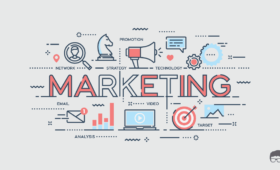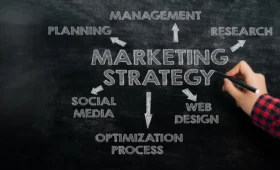As the marketing landscape evolves, staying ahead of trends and adapting to changing consumer behaviors is critical. By 2025, we expect several trends to dominate the industry, driven by new technologies, shifting preferences, and more engaged audiences. Here are the top marketing trends to watch out for in the coming years.
1. AI and Machine Learning in Marketing
The use of artificial intelligence (AI) and machine learning in marketing is growing rapidly, and by 2025, these technologies will be even more ingrained in marketing strategies.
- Personalized Marketing at Scale: AI will allow brands to deliver highly personalized experiences at scale. From personalized product recommendations to tailored content, AI will enable businesses to better understand their customers and create more meaningful interactions.
- Automation and Efficiency: Marketing automation tools powered by AI will streamline processes like lead scoring, customer segmentation, and content creation, allowing marketers to focus more on creative strategy and less on manual tasks.
2. Voice Search and Conversational Marketing
Voice search is becoming more prominent with the rise of virtual assistants like Siri, Alexa, and Google Assistant. By 2025, voice search will change the way businesses approach SEO and digital marketing.
- Optimizing for Voice Search: Marketers will need to optimize their websites and content for voice search queries, focusing on conversational keywords and long-tail phrases that match how people speak.
- Conversational Marketing and Chatbots: Brands will increasingly use AI-powered chatbots and messaging platforms to engage with customers in real-time, answering questions, solving problems, and guiding them through the sales process.
3. Video Marketing and Live Streaming
Video will continue to be a key component of successful marketing strategies in 2025, especially with the rise of live streaming and short-form video content.
- Short-Form Video Content: Platforms like TikTok, Instagram Reels, and YouTube Shorts will remain at the forefront of video marketing, driving brands to create engaging and shareable content that captures consumers’ attention quickly.
- Live Streaming Events: Brands will leverage live streaming for product launches, behind-the-scenes events, Q&A sessions, and live shopping experiences. This real-time connection with audiences creates a sense of authenticity and urgency.
4. Social Commerce and Shoppable Content
Social commerce is transforming the way people shop online, and by 2025, this trend will only become more pronounced.
- In-App Shopping: Social media platforms will further integrate shopping features, allowing users to purchase products directly within the app without leaving the platform. Brands will take advantage of features like Instagram Shops, Facebook Marketplace, and TikTok’s native shopping options.
- Shoppable Content: From Instagram posts to influencer endorsements, brands will create more interactive, shoppable content that allows users to buy directly from videos, images, and stories.
5. Sustainability and Ethical Marketing
Consumers are increasingly concerned with sustainability and corporate responsibility. In 2025, this focus on ethical practices will be central to successful marketing campaigns.
- Eco-Conscious Marketing: Brands will be expected to demonstrate their commitment to sustainability through eco-friendly products, responsible sourcing, and transparent supply chains. Marketing messages will highlight these efforts and resonate with consumers who prioritize environmental responsibility.
- Purpose-Driven Campaigns: Consumers want brands to stand for something bigger than profits. Purpose-driven marketing, where brands advocate for social issues or environmental causes, will continue to grow as a major focus for consumers, especially younger generations.
6. Influencer Marketing and Authenticity
Influencer marketing will continue to be an important part of marketing strategies in 2025, but the focus will shift toward authenticity and long-term relationships.
- Micro and Nano-Influencers: While big-name influencers still play a role, brands will increasingly work with micro and nano-influencers (smaller, more engaged audiences) who offer higher trust and relatability to their followers.
- Long-Term Partnerships: Instead of one-off sponsored posts, brands will collaborate with influencers on long-term campaigns, cultivating trust and loyalty with their audiences over time.
7. Data Privacy and Customer Trust
As data privacy concerns continue to grow, building trust with consumers will be a key priority for brands in 2025.
- Transparent Data Practices: Brands will need to be transparent about how they collect, store, and use customer data. Providing customers with control over their personal data and demonstrating a commitment to privacy will be essential for maintaining trust.
- Customer Consent and Security: With the introduction of stricter data protection regulations, brands will implement robust data security measures to protect customer information and ensure compliance.
8. Omnichannel and Seamless Experiences
In 2025, consumers will expect a seamless experience across all touchpoints, from mobile apps to physical stores, websites, and customer service.
- Consistent Messaging: Brands will need to ensure that their messaging is consistent across all channels. Whether a consumer interacts with the brand on social media, via email, or in-store, they should experience the same brand voice and experience.
- Cross-Platform Shopping: Consumers will expect to shop and interact with brands seamlessly across multiple platforms, whether it’s on a mobile app, website, or in-store experience. Companies will integrate their online and offline strategies to create a unified brand experience.
Conclusion
Marketing in 2025 will be defined by technological advancements, changing consumer behavior, and the continued rise of personalized, interactive experiences. Brands that embrace AI, voice search, sustainability, influencer authenticity, and omnichannel strategies will be best positioned for success. As consumers become more discerning and demand better customer experiences, the future of marketing will require agility, creativity, and a focus on long-term relationships with customers.




